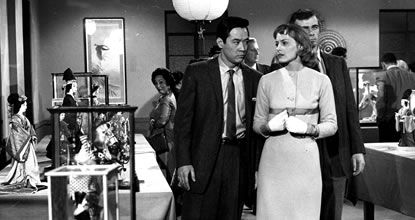The story centers on two LAPD homicide detectives, Joe Kojaku (James Shigeta, perhaps best known as Mr. Takagi from 1984’s Die Hard.) and Charlie Bancroft (Glenn Corbett) investigating the shooting murder of a celebrated stripper. The detectives, friends, partners, and roommates,  following their service together in the Korean War, have little to go on to solve the murder save the stripper’s plans for a new act inspired by Japanese culture. Their investigation brings them into contact with local painter Christine Downs (Victoria Shaw) and a romantic triable between the two detectives and Christine forms threatening both the investigation and Joe’s and Charlie’s friendship.
following their service together in the Korean War, have little to go on to solve the murder save the stripper’s plans for a new act inspired by Japanese culture. Their investigation brings them into contact with local painter Christine Downs (Victoria Shaw) and a romantic triable between the two detectives and Christine forms threatening both the investigation and Joe’s and Charlie’s friendship.
The Crimson Kimono is bold in its depiction of interracial romance in defiance of the Production Code still a year out from its official abandonment in 1968. Joe Kojaku and the other Asian characters, both Korean and Japanese, are treated with respect and written as fully developed characters with their ethnicity as an aspect of their characters and not the sole defining elements. the friendship between Joe and Charlie feels real and has the depth that writer/Director Sam Fuller often explored in men who have seen brutal combat. Christine is a little less fully developed but does have at least a few layers to her personality.
Fuller’s script is clumsy in handling the twin plots of this brief 82-minute movie, never quite grasping a pleasing balance between investigation and romantic drama with large sections that make it seem like the other thread has been forgotten. While the film deals with racism and is plainly anti-racist in its views it also is hampered by a naivete as to racism’s prevalence in American society. I found it impossible to accept Joe’s assertion that he had never encountered anti-Japanese racism once in the Army or on the LAPD force. The declaration dramatically undercut the tension when Joe has mistakenly believed that Charlie’s animosity is in part racially inspired.
The film is further harmed by a score that attempts to incorporate traditional Western and Asian musical themes but does so in a manner that feels cheap and inauthentic with the Asian motifs sounding more like parody or satire.
However even with those fairly blatant flaws The Crimson Kimono remains a brave piece of fiction depicting love, romantic and otherwise, between characters of different races and manages to thematically tie the murder at the center of the mystery to this premise.
